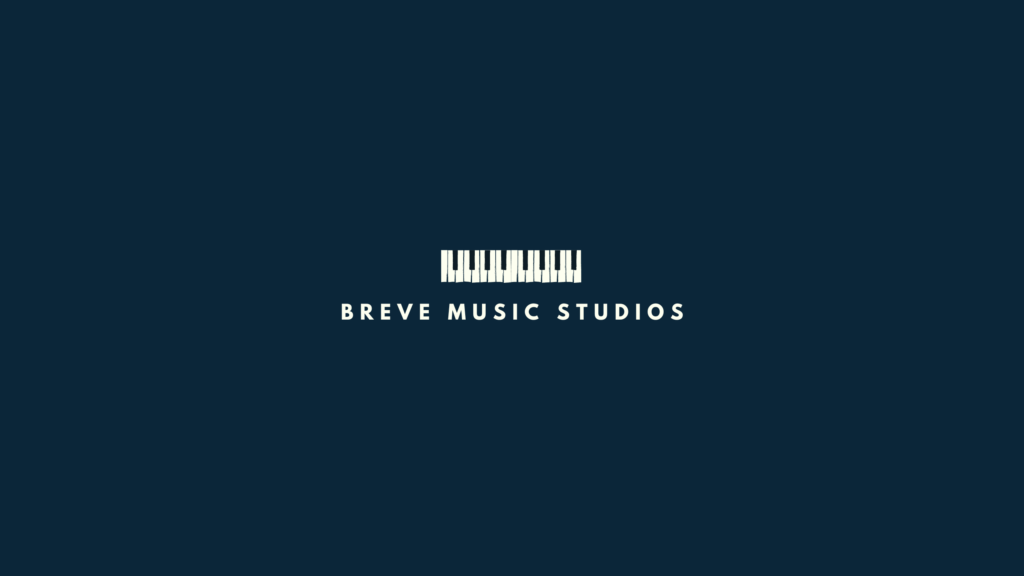Table of Contents
Introduction
Seamlessly merging reality with fictitious interactivity, the Metaverse introduces an innovative horizon for various industries, and notably, music is not left out of this transformative juncture. Venturing beyond just a buzzword, the Metaverse is subtly sketching a new blueprint of how music is created, distributed, enjoyed, and monetized. It’s a fascinating addition to our daily lives – a virtual, yet vividly realistic hybrid universe where various elements of music converge seamlessly with technology. This novel fusion breeds limitless imaginative possibilities and opportunities for artists, producers, and enthusiasts globally, reinventing traditional concepts of music creation and consumption.
Understanding the Metaverse and Music
In simplest terms, the metaverse is a collective virtual shared space created by the convergence of virtually enhanced physical reality and physically persistent virtual spaces. It is a digital reality that includes multiple universes, virtual reality, augmented reality, and the internet. The metaverse is a hub for multiple interactions, communications, and digital creations. So, what happens when you place the metaverse and music together?
Imagine an arena full of eager fans waiting for their favorite artist to perform live, except this time, the crowd is gathered virtually and the concert is in a shared digital space. Welcome to the new age of music concerts, courtesy of the metaverse.
The metaverse serves as a groundbreaking platform for artists where they can recreate their live music concerts and connect with fans globally, breaking the geographical boundaries. The technology enables musicians to engage with fans in ways that were not possible before.
The virtual space allows artists to explore creative ways of presenting their music, such as interactive visual experiences that go along with songs. Instead of setting up a concert stage, they could pick a moon, or a forest or a fantasy landscape. The possibilities are endless!
The music industry has always adapted to the technological transitions taking place worldwide. The evolution from radio to records, cassettes and CDs to digital streaming symbolizes the industry’s ability to adapt and thrive. With the advent of the metaverse, the music industry is set to undergo another major transformation.
Musicians and artists can leverage this technology to push their creativity to a new level. The metaverse creates an environment where a singer’s performance is not limited by physical constraints. In addition to virtual concerts, artists can organize digital meet-and-greets, launch music in immersive environments, and even create exclusive metaverse merchandise.
Fans also stand to gain from this new chapter in the music industry. The metaverse offers them a unique way to interact with their favorite artists, beyond the standard social media exchanges. They can attend concerts virtually, have immersive music-related experiences, and get opportunities to engage with artists and music like never before.
The metaverse isn’t just for delivering music; it can also be instrumental in creating music. Virtual sound spaces can allow artists to jam and record together from different parts of the world, making internet collaborations more immersive and spontaneous. Music teaching and learning can unfold in the metaverse too, with virtual mentorship opportunities, allowing students to learn from their favorite artists in one-on-one settings.
In the creative sphere of the metaverse, the boundaries are continually shifting. Concepts like decentralized autonomous organizations (DAOs) present opportunities to musicians and enthusiasts to own, create, and monetize music in new ways.
The metaverse is unveiling a whole new realm of possibilities for the music industry. With its revolutionary features that allow artists and fans to connect in unique virtual environments, it’s transforming the way we experience music. As an avid fan and hopeful participant, the metaverse could be the platform you need to showcase your talents to a larger audience. By understanding and embracing this quickly evolving technology, you can redefine your music and interactions with fans. It’s an exciting time to step into the future and explore the limitless opportunities the metaverse brings to the world of music.
Influence of Metaverse on Music Creation and Distribution
Music Creation in the Metaverse
The metaverse is an uncharted territory that invites all fields of creativity to explore, music included. These digital landscapes provide unprecedented avenues for music creators to stretch their innovation and versatility. Collaborators can work together in shared virtual spaces, undeterred by time zones or borders, using avatars. These simulated environments allow musicians to meet virtually in a studio, creating and performing music together. The metaverse not only offers virtual instruments and sound equipment but also a chance to experiment with new musical styles and techniques that may be challenging or costly to achieve in the physical world.
Avatar Role in Music Creation
Avatars are more than just digital representations of musicians within the metaverse. They offer a new medium for artistic expression and storytelling. For instance, musicians can modify their avatars based on the theme of the music, adding another layer of depth to the listeners’ experience. Avatars also allow musicians to bypass physical limitations and perform activities that are impossible in the real world, adding a novel aspect to music videos and concerts.
Also, fans can interact with musicians’ avatars, exuding a sense of proximity and engagement that traditional formats struggle to deliver. This immersive experience can potentially revolutionize fan-artist relationships and enhance fan loyalty.
New Modes of Distribution and Consumption
The metaverse also introduces drastic shifts in how music is distributed and consumed. Traditionally, distribution involves record labels or digital platforms like Spotify and Apple Music. However, within the metaverse, artists can directly distribute their music, bypassing intermediaries, consequently reducing costs and increasing profits.
Additionally, artists can perform live concerts within the metaverse, offering a unique, immersive experience to global fans. During these events, fans can interact with each other, engage with the performers, and even effect changes in the performance in real-time, bringing a new dimension to live performances.
Blockchain Technology and NFTs
The emergence of blockchain technology and non-fungible tokens (NFTs) within the metaverse adds another layer to the music industry. NFTs enable musicians to create, sell, and trade unique digital assets, such as exclusive tracks or album art. This enables them to monetize their work in innovative ways while ensuring authenticity and ownership rights.
Furthermore, smart contracts on the blockchain can automate royalty payments whenever music is played or purchased, providing fair and transparent compensation to artists.
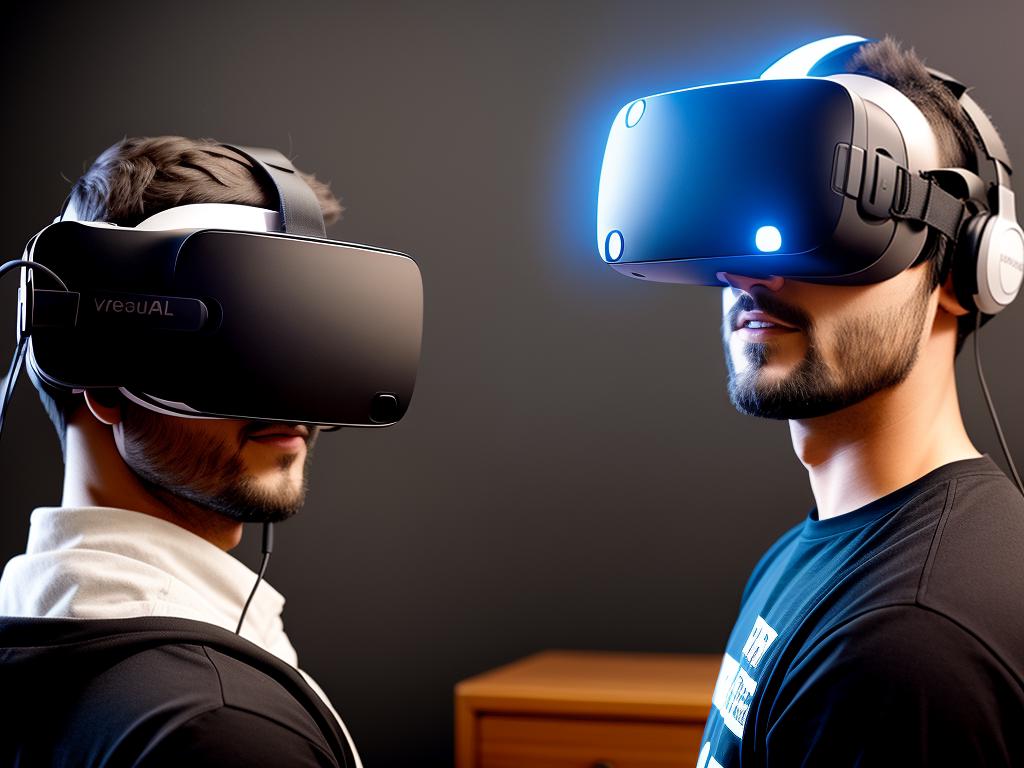
Live Performances and Concerts in the Metaverse
Navigating the Metaverse: The Emergence of a Revolutionary Musical Stage
The metaverse orchestrates a novel perspective on music, fundamentally altering the traditional relationship between performers and listeners. This digital universe obliterates geographical and temporal barriers, immerging audiences worldwide in live performances and concerts on demand. The advent of immersive technologies such as Virtual Reality (VR) and Augmented Reality (AR) foster this revolutionary reshaping of live performance, bringing the musical experience directly into the personal space of global audiences.
Virtual Stages: A Game-Changer for Music Performance
In the realm of the metaverse, physical stages are replaced by virtual ones. The advent of VR technology has brought about a new era of concert performances, where musicians perform in a virtual space. These 3D environments offer greater customization and versatility than traditional settings. Artists can adapt and transform the virtual stage according to their creative vision.
This shift extends beyond the stage itself. With VR technology, musicians can create immersive experiences that incorporate visuals, interactive elements, and even story-telling aspects into their performances. This degree of interaction and immersion is virtually impossible in a traditional live performance setting.
Immersive Audience Experiences: Elevating the Concert Experience
Beyond simply observing, audiences in the metaverse can directly interact with the ongoing concert. Utilizing VR tech, audience members can experience the concert from various angles or perspectives, move within the virtual environment and potentially interact with the performer.
Further, the metaverse brings the possibility of unlimited attendance, allowing audiences from any corner of the globe to attend the concert. This removes the restriction of venue capacity and geographical location, making concerts more accessible to a wider audience.
Ticketing: Rethinking Event Access
Since physical presence is no longer required, ticketing for music concerts in the metaverse represents another paradigm shift. Digital tickets can be purchased through online platforms, with purchasers receiving access codes to enter the virtual concert space. This also opens up possibilities for different ticket tiers, including ‘backstage’ VR access, meet-and-greet sessions, or personalized shoutouts from the artist.
Addressing Challenges & Prospects in the Metaverse
Just like other uncharted territories, penetrating the metaverse presents certain issues that the music industry needs to conquer. The main concern orbits around the accessibility and cost-effectiveness of VR and AR technology to the general public. Even though substantial developments have been made by major tech corporations in this sphere, global accessibility remains a goal to be reached.
From the perspective of the artists, mastering this technology, designing enticing virtual atmospheres, and executing flawless performances could present hurdles. These obstacles could potentially be reduced with appropriate training and practice in the virtual environment.
Furthermore, the metaverse doesn’t eliminate existing concerns over digital rights and piracy. However, Blockchain-powered solutions like Non-Fungible Tokens (NFTs) offer a promising approach to authenticate ownership and guard the intellectual rights of artists.
In summary, the metaverse provides additional opportunities to transform music performances, offering a level of accessibility, interactivity, and personalization that were previously unattainable. Artists have the potential to design extraordinary encounters for their global fan base, transcending conventional boundaries and constraints. However, these potentials can only be reached following the successful navigation of various technological and legal hurdles.
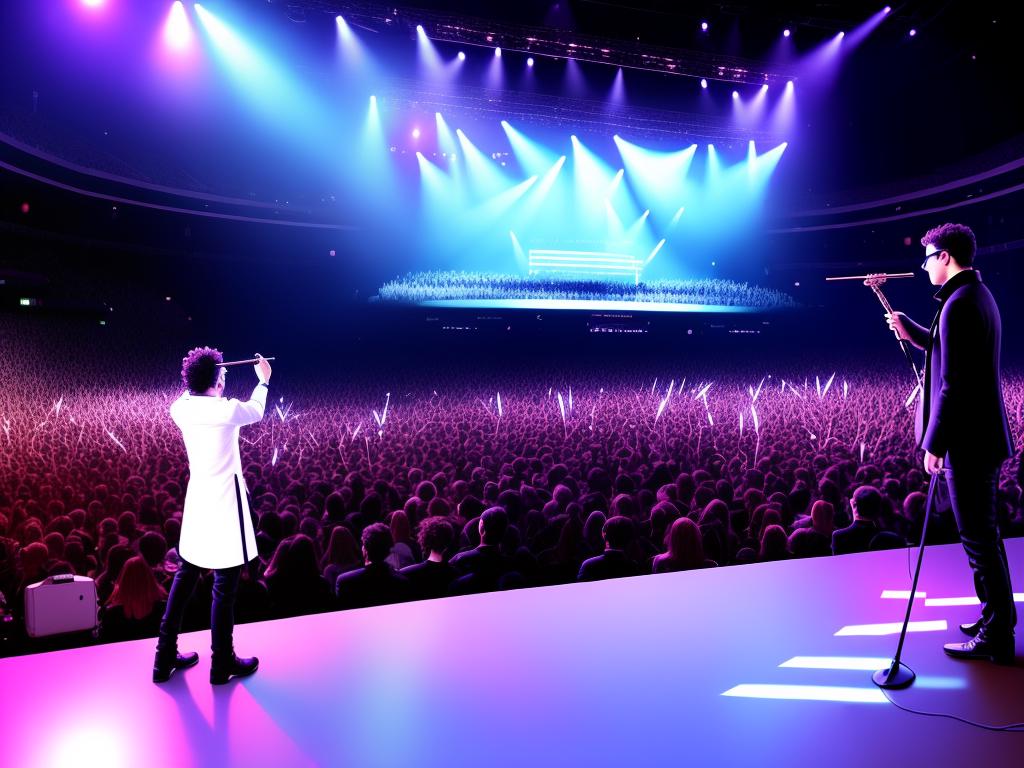
Monetization and Royalties in the Metaverse
Decoding the Impact of Metaverse on Music
The term metaverse describes an extensive digital cosmos that functions as an extension of our physical existence, empowered by immersive technologies such as virtual reality, augmented reality, and blockchain. Among the many sectors feeling the ripple effect of the metaverse’s emergence, the music industry is heavily impacted. This development heralds a series of key revisions in the methods employed by artists and producers to create, disseminate, and monetize their music.
Monetization Opportunities Within the Metaverse
Within the metaverse, artists and producers can potentially monetize through a variety of methods. They might perform virtual concerts, sell digital merchandise, or create immersive music experiences within this digital reality. This opens up a new revenue stream that taps into an audience beyond the confines of our physical world. Moreover, given the blockchain’s integral role in the metaverse, artists can mint their music as non-fungible tokens (NFTs) and sell them. These NFTs can represent digital ownership of unique pieces of music, offering an innovative pathway for direct monetization.
Royalties in the Metaverse
The system of music royalties also undergoes a transformation within the metaverse. As artists directly mint and sell their music as NFTs in this space, they can program smart contracts to automatically pay them royalties every time their music NFT is resold. This model significantly deviates from the traditional royalty system, where artists typically rely on intermediaries such as record labels and performance rights organizations to collect and distribute royalties. In the metaverse, artists can maintain greater control over the rights to their music and enjoy a more direct and equitable share of the royalties.
Legal and Policy Dimensions of Metaverse Music
As the metaverse intersects with the music industry, it invites various new legal and policy considerations. Intellectual property rights emerge as a key concern. For instance, ensuring that musicians are fairly compensated for their work requires adequate attribution and mechanisms to prevent unauthorized use or reproduction of their music in the metaverse.
Data protection and privacy laws are equally relevant. As metaverse platforms collect user data, they need stringent measures to protect this data and ensure adherence to privacy regulations.
Finally, the establishment of a legal and policy framework that governs the recognition and enforcement of smart contracts is critical. This is central to upholding the rights of artists over their music and enforcing the terms of their royalties within the metaverse.
The Intersection of Creativity and Regulation in the Metaverse
As the virtual spaces of the metaverse continue to evolve, there’ll inevitably be a need for regulations that balance artists’ rights, user privacy, and a thriving music ecosystem within this new realm. Such regulatory frameworks need to evolve hand in hand with the maturing metaverse, ensuring that the creative commons and music venues in these digital spaces are well protected and properly managed.
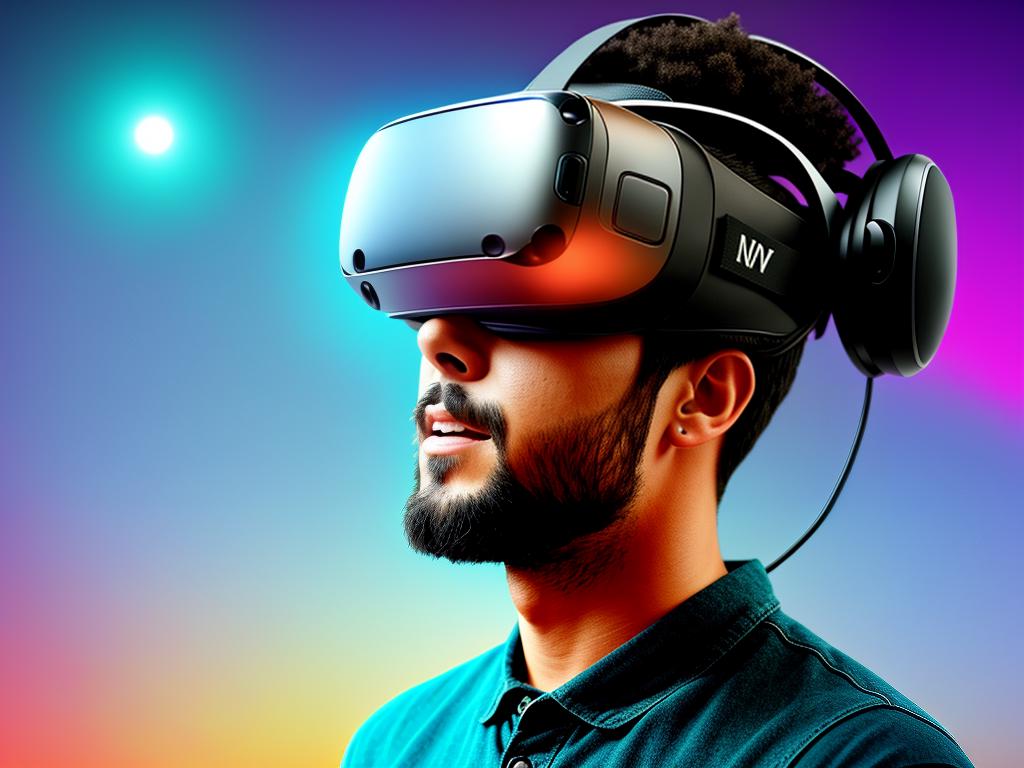
Prospective Future of Music in the Metaverse
Metamorphosis of the Music Industry through Technological Progression
Technology has consistently been at the forefront of revolutionizing the process of music creation, its distribution, and the manner in which it is consumed. This is all the more pertinent within the developing metaverse, where immersive technologies like Virtual Reality (VR) and Augmented Reality (AR), combined with blockchain technologies are becoming intrinsic to the music landscape.
Blockchain, for example, introduces new models for music distribution and financial gain. With Non-Fungible Tokens (NFTs), artists can now tokenize their work, effectively transferring ownership rights to ardent fans in return for support. Such low-tedium, direct-to-audience transactions ensure that the artists are cut the lion’s share of their profits, bypassing the traditional avenues that have often shortchanged them.
On the other hand, AR/VR technologies add another dimension to the musical experience. Virtual concerts, exemplified by Travis Scott’s concert in Fortnite, highlight the potential of such technologies to create engaging music experiences within the metaverse. By creating fully digitalised landscapes that complement their music, artists can transport their audience into immersive worlds, adding layers of interactivity and engagement that surpass what’s achievable in the physical realm.
Emerging Trends in Music in the Metaverse
The rise of the metaverse has seen some notable trends emerge at the intersection of music and technology. Virtual concerts, as mentioned, are one such trend. Artists are hosting events in virtual spaces, attracting millions of fans worldwide who can interact with the music and each other in unique ways.
These concerts are often free to attend, opening up accessibility to fans who may not be able to afford traditional live events. Furthermore, these events offer a convergence of different media, incorporating gaming, social networking, and visual art alongside the live music performance.
Another emerging trend is the concept of “meta-instruments” or musical instruments specifically designed for the metaverse environment. These instruments are virtual, existing only within the digital world, and offer sounds and playing techniques that may not be achievable in the physical realm.
Opportunities and Challenges for Metaverse and Music
The metaverse creates new opportunities for artists to connect with their audiences and monetize their art in innovative ways. It decentralizes the music industry and empowers artists by enabling them to retain more control over their work.
However, it also presents new challenges. Issues of IP protection and ownership, as well as ensuring fair compensation for artists, are amplified in the digital context. Copyright infringement and piracy are also concerns.
Building awareness and acceptance of the evolving music landscape in the metaverse can be challenging. Educating consumers about the value of music in this environment, and why they should engage with and pay for it, will be a significant task.
In conclusion, the metaverse is set to bring a wave of evolution to the music industry. It offers exciting opportunities for artists and fans alike, but also presents unique challenges that will require careful and strategic management. As technology continues to advance and the metaverse becomes increasingly woven into our everyday lives, it’s clear that music’s future in this brave new world will be a fascinating journey to watch.
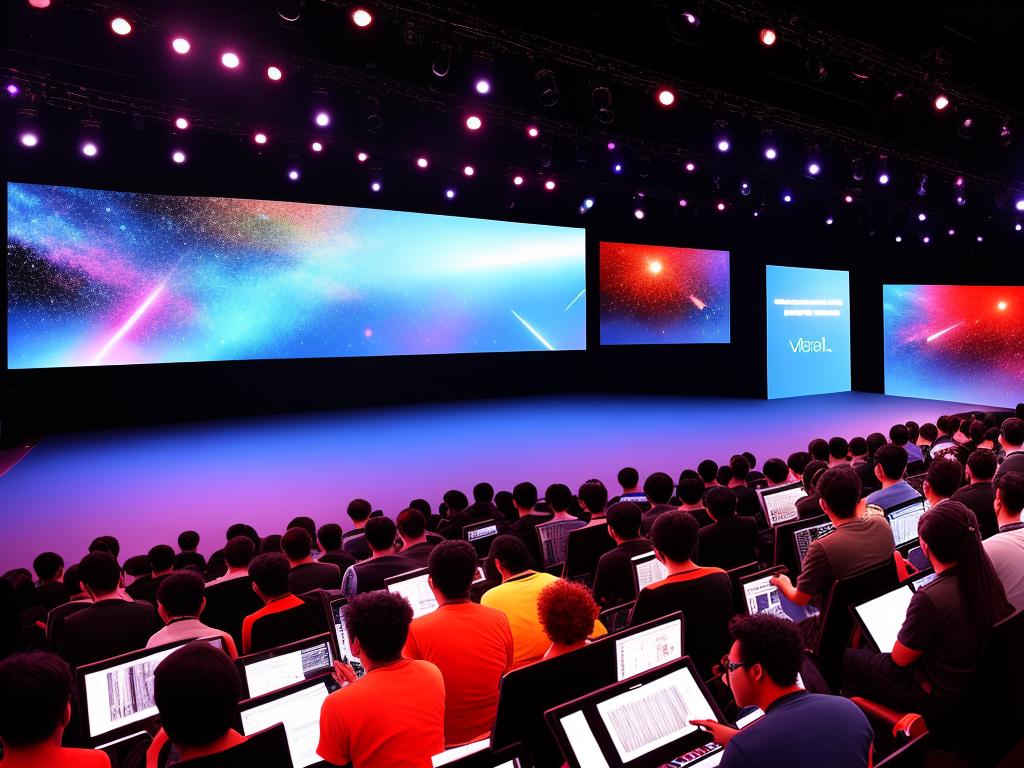
Conclusion
The metaverse is not just a fleeting trend. It is an innovative shift that could potentially redefine the music industry’s landscape. With increasing technological capabilities, we are navigating toward a reality where physical and digital experiences harmoniously coexist, offering increased interactivity and participation to music lovers worldwide. While the concept still has its challenges and uncertainties, the potential it holds for the music industry far outweigh any temporary hurdles. Consequently, if navigated deliberately and intelligently, the metaverse can indeed be music’s next groundbreaking evolution, further blurring the line between the artist and the audience, and heralding a new era of immersive musical experiences.
Additional Reading
Take some time to check out our other articles:
- Popular Music Industry Careers
- The Metaverse and Music
- 7 Essential Music Production Tools Under $100
- 5 Best Ways To Invest In Music
Breve Music Studios publishes music to Spotify, YouTube Music, Amazon Music and more. Follow our pages on Facebook, Instagram, Twitter, TikTok, and YouTube.
Listen to our ensembles: Breve Orchestra, Breve Music Ensemble, Breve Low Brass Ensemble, Breve Woodwind Ensemble, and Jermaine Harris on Spotify.
